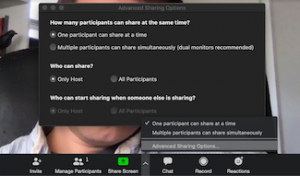As soon as students at Hunter College got the hang of online classes, they were forced to deal with zoombombing. Now while taking advanced level courses in their pajamas, they worry about uninvited strangers popping into their classes.
Roughly, 23,000 students are enrolled at Hunter College and some are using Zoom for their distance learning class. While students and teachers prefer the easiness of Zoom, there is one downside: Zoombombing. Zoombombing is when someone uninvited joins a video session. In some cases, zoombombers hurl racial slurs or profanity or share pornography and other offensive imagery.
Last week during her film production lecture class online, junior Helena Barry noticed an inappropriate comment appear in the public chat. “We were in shock,” she said. “We didn’t think somebody would do that to our class. He was immediately removed from the classroom, but it did cause our class time to stray away from what we were learning,” Barry said.
Her professor, Deepak Rauniyar, quickly removed the account. He assumes the zoombomber got a hold of a guest link that was provided to his class via email. He called the act “selfish.”
“I wasn’t mad about the comment, but more so the interruption it caused in the classroom,” said Rauniyar. “Remote learning is already a struggle, so to disrupt my students from their learning is disappointing.” He now conducts classes with the waiting room, where he now has to accept individually who enters the chat. This makes it harder for students who can only reach the class by guest links.
Having guest links in the classrooms can allow students who may have technical difficulties or lost their login to still attend virtually. However, the practice of individually accepting students or turning off the guest links can hinder students furthermore. Alice Stolk, a senior in Rauniyar’s class, was sad to see them go. “It’s a lecture class with nearly 100 students, I’m pretty sure not everybody is gonna be able to login perfectly. The zoombomber doesn’t realize his actions has its effects,” Stolk said.
To help keep the learning environment safe for students, Zoom introduced a number of settings that professors can use. Zoom released a statement that incorporates steps for people to take that would decrease the likelihood of Zoombombing. They include directions on a waiting room, how to lock a meeting, set up two-factor authentication, remove unwanted or disruptive participants, allowed removed participants to rejoin, mute or hold participants, disable video, turn off file transfers or annotation and disable private chats. Zoom provided tutorials for all that were listed in response to recent breaches of privacy and security.
“It was like an ambush,” said Johanne LeBlanc. LeBlanc, a junior, was in her weekly computer science seminar when a zoombomber entered her class. About five minutes into the meeting someone took over the screen and using the Zoom whiteboard function started drawing explicit images. This resulted in her professor canceling that class session entirely.
LeBlanc felt she missed out on vital information she could’ve been learning. “Our professor didn’t immediately know where it was coming from, so while he was trying to kick them out, it wastes time during our class. We don’t get much time and access to our professor as we used to, so to abuse the little time we have is absurd,” she said.
Hunter College put out a “how-to” guide to limit zoombombing. The policy requires similar methods produced by Zoom  and new ones like setting passwords for meetings, not publicizing Zoom meetings on social media or public platforms, updating to the latest version and not using a personal ID to host a meeting. These guidelines also correspond with the CUNY Zoom Security Protocol. They also apply to other platforms like Blackboard or Microsoft Teams when conducting CUNY online classroom sessions.
and new ones like setting passwords for meetings, not publicizing Zoom meetings on social media or public platforms, updating to the latest version and not using a personal ID to host a meeting. These guidelines also correspond with the CUNY Zoom Security Protocol. They also apply to other platforms like Blackboard or Microsoft Teams when conducting CUNY online classroom sessions.
According to Insider, experts state that zoombombing has become popular during the quarantine. Gabriella Coleman teaches about computer hackers and digital activism at McGill University. “Trolls will descend on any situation and exploit what many researchers call a socio-technical vulnerability, to prank and harass,” Coleman said to Insider.
Acts of this kind are usually done in an attempt to gain a few cheap laughs at the expense of the participants. “I see it as harmless fun,” said an unnamed zoombomber who wants to remain anonymous due to legal reasons. “Yes, it distracts the class a little but it’s all for a little bit of laughter.” He said he doesn’t see it in a negative way or to extreme lengths of violating privacy.
Zoombombing may violate various federal and state laws. Federal prosecutors have warned hackers and pranksters about the potential legal implications of zoombombing. A warning was posted through a press release that is on the Department of Justice’s website under the US Attorney’s office for the state’s Eastern district with support from the state attorney general and the FBI.
“Zoombombing was a new, sporadic thing for us college students,” said student Barry. “Gladly, Hunter and CUNY was able to address it quickly.”

